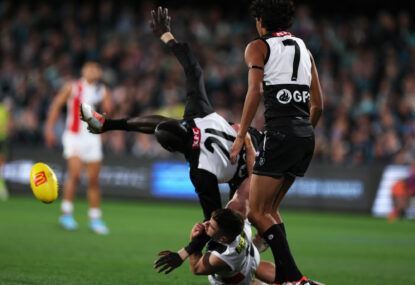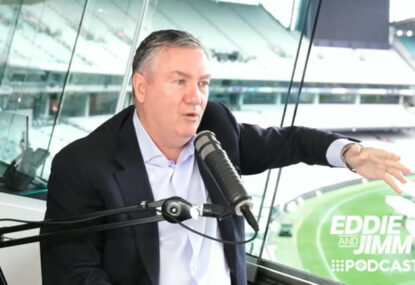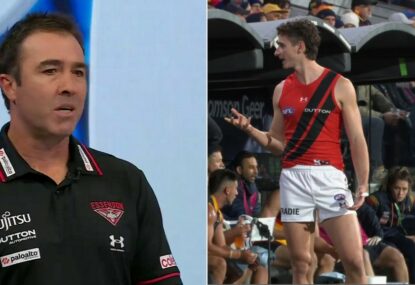In the midst of a seemingly normal radio interview, Tigers spearhead Jack Riewoldt found himself on receiving end of a plea.
“Wouldn’t it just be a great moment?” implored Mark Robinson, for the umpteenth time; “it would just be fantastic”.
Robinson wanted an embrace between Jack and his cousin Nick, sometime during a game designed to remember Nick’s deceased sister, Maddie. Robinson also wanted this moment after a Nick goal, most likely meaning Jack would have to run a couple of hundred metres to make it happen.
What Robinson wanted was just that – a moment. An instant that transcends the game that is being played and sticks in the memory of everyone lucky enough to witness it. But what he didn’t realise was that he, by begging for this manufactured moment of emotion to take place, was summing up everything that is wrong with the attitudes of many towards the game.
The AFL has a serious issue with cultivating the organic, and it is an issue that those with a voice that can be heard within the game are seemingly going out of their way to problematise.
Football, like most sports, sticks in the mind of the supporter not for the sum of its parts, but for its electric capacity to excite in ever-so-brief moments.
Paul Licuria’s tears on grand final day are a beautiful encapsulation of the game at its most emotional, but no one outside of the most diehard Collingwood supporters would remember how he played that day.
Players such as Garrick Ibbotson and Nick Smith go unnoticed by the general audience for their team-defensive based brilliance, but Jeremy Howe’s high-marking oriented game will probably see him command upwards of $600,000, and his number on the back of countless football jumpers.
The reason that players like Howe, or moments like Licuria’s tears are so special is because they occur in among the “mundane” that is the games existing around them. What is seemingly being lost among those in the media calling for change is that radical solutions will not cause more moments, but rather lessen the brilliance of what we are seeing.
The AFL is not alone in this thirst for immediate and regular gratification. When Michael Jordan took flight from the free throw line in 1985 Slam Dunk Contest, not only did he demonstrate what few thought possible, he launched one of the most successful careers and brands known to world sport.
Shoes adorned with Jordan’s airborne silhouette became such hot commodities that they were seen as worth literally stabbing another person over. Life-sized billboard, Gatorade endorsements, references on Seinfeld. All of it born out of that one star-making moment.
But what of the contest in 2015? Won by a rarely sighted rookie, and forgotten the next day, yet another excessive indulgence of “highlights” among a homogenised market that did not know how much was too much of a good thing.
It is no coincidence that much of the change being called for is from those far removed from the game itself. Channel Seven commentator Leigh Matthews, a man more irrelevant to the current AFL with each passing day, has been one of the loudest exponents of change. Radical ideas such as shot clocks and heavily restricted interchange caps have been suggested, all aimed at reducing the so-called evil of the day, congestion.
The game, so we are told, was better in the commentator’s day, and what we are seeing now isn’t football, but rather ‘basketball’, ‘rugby’, or, at its absolute worst, ‘netball’.
What commentators like Matthews do not realise is that their ‘football’ is not dead, but rather has evolved, played by athletes whose skillsets and professionalism far trump anything seen from a bygone era.
Nostalgia, in spite of all of the fondness it generates, can be a powerful delusion. The notion that the game is somehow worse in its current form is nonsense, from spectators who are yearning for a time where, in spite of what they would have you believe, ugly games did happen, and a time where mindless forward momentum and king hits to unsuspecting players were seen as good play.
The myth of congestion ruining the game is just that, a myth. Spectacular marks are still being taken, and breathtaking goals are still being kicked. Ask any Western Australian football fan, and they will tell you that the game, on the back of their two dominant footballing machines, is better than it has ever been.
More to the point, it cannot simply be a coincidence that talk of the game’s “demise” comes at a time when three of the so-called “Big 4” clubs sit well outside of the top 8, with two (Carlton and Essendon) having serious grey clouds gathering over their futures.
Football, by nature of the vast allowance for strategic development, will always be a game in a state of evolution. Not only is it unrecognisable to the game of Matthews’ era, but even to the game of five years ago.
We can only hope that it is left to develop organically, rather than be mutated at the behest of bored, irrelevant and confused old men.



































































































